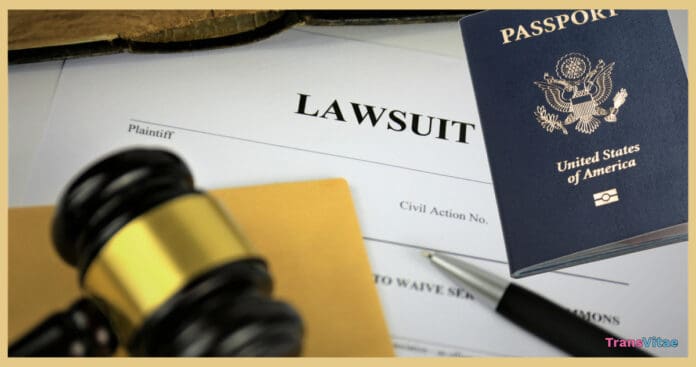A group of seven transgender and non-binary Americans has filed suit against the Trump administration, alleging that a new rule preventing passport sex designations from aligning with one’s gender identity violates their constitutional rights. Represented by the American Civil Liberties Union (ACLU), the plaintiffs argue that the policy, introduced via executive order on President Donald Trump’s first day back in office, is illegal, discriminatory, and detrimental to the health, safety, and freedom of transgender individuals across the country.
The Executive Order and “Biological Truth”
The lawsuit, filed in a Massachusetts federal court, claims that the State Department’s revised passport protocol conflicts with constitutional protections against sex discrimination and infringes on rights to privacy and free speech. Under previous policies, transgender and nonbinary Americans could update their passport gender markers to reflect their lived reality. Now, by order of the president, the government has pivoted back to defining sex as strictly “male” or “female” based on presumed reproductive function, without regard to individual gender identity.
In their complaint, ACLU lawyers labeled the new policy a product of “impermissible animus.” They argue that not only does the policy erase the existence of transgender, intersex, and nonbinary people, it also exposes them to heightened scrutiny and risk whenever they need to travel. By forcing individuals to present a passport inconsistent with their appearance and identity, the policy can out them against their will, putting them in vulnerable positions and, in some cases, endangering their safety.
Plaintiffs Speak Out
One of the plaintiffs, 35-year-old Massachusetts resident Reid Solomon-Lane, expressed distress over the forced mismatch between his identity and his documentation. “Everyone in my personal and professional life knows me as a man,” he said in a statement released by the ACLU. “I would be forcibly outed every time I use my passport for work or vacation if it doesn’t match who I am.” Solomon-Lane, a married father of three, is deeply worried about the emotional, financial, and security consequences of possessing documents that contradict his daily life.
The administration’s stance stems from an executive order Trump signed, titled “Defending Women from Gender Ideology Extremism and Restoring Biological Truth to the Federal Government.” Arguing that “gender ideology” has sown confusion and should be banned from government use, the order directs agencies to recognize only two sexes—male and female—on all identification forms. It mandates that passports reflect a person’s “biological sex,” disregarding an individual’s self-identified gender. The president asserts that this measure upholds “biological truth,” yet civil rights advocates see it as an overt attempt to undermine existing legal protections for LGBTQ+ communities.
For people like Zaya Perysian, a 22-year-old transgender woman in California, the policy shift has already changed life overnight. Shortly after submitting an application to update her passport, Perysian was dismayed to find the document arrived marked “male.” She denounced the government’s swift action, explaining how documents that mismatch her identity could invite hostility at airport checkpoints, border crossings, and security lines—places where transgender people have long faced bias. “I am not a man, and I will not accept being seen as one while traveling,” she said.
ACLU’s Response and Wider Community Concerns
Civil rights advocates warn that the policy’s sudden implementation has brought chaos and confusion. The State Department has suspended processing any requests involving changes to existing passports’ gender markers. In some instances, individuals who submitted applications well before the executive order are stuck in limbo, waiting for guidance on whether their supporting documents, including birth certificates and marriage licenses, will be returned. Critics contend that this uncertain environment is part of a deliberate tactic to discourage transgender people from maintaining accurate identification.
According to Sruti Swaminathan, a staff attorney with the ACLU’s LGBTQ & HIV Project, more than 1,500 transgender people or their family members have already contacted the organization with concerns about being denied accurate documentation or having their applications halted. Swaminathan called the policy a “clear manifestation of discrimination” that lacks any legitimate public interest: “Our clients need to travel, see family, attend school, and conduct business like everyone else. They deserve passports that honestly reflect who they are.”
Global Ramifications
Beyond immediate travel implications, some critics fear that the administration’s new guidelines will resonate globally. Under the Biden administration, the State Department had introduced an “X” marker option, affording a measure of relief and recognition for nonbinary citizens. By rolling back these provisions, Trump’s order may signal to other nations that the United States is retreating from transgender rights. Activists worry this could embolden anti-trans movements worldwide and complicate international travel for transgender Americans, who might face suspicion or outright denial of entry if their documentation appears inconsistent.
Meanwhile, members of the transgender community report feeling heightened anxiety. Ash Lazarus Orr, a trans activist in West Virginia, said his passport application was “set aside” by officials, leaving him stranded without personal documents like his birth certificate and marriage license. Orr planned international travel and a move out of state—potentially for safety reasons—but now faces yet another barrier. “It’s designed to make things harder for trans and nonbinary people,” he said, decrying the confiscation of personal records without a clear path to retrieval.
The Bottom Line
As the lawsuit progresses, the ACLU and other advocacy groups vow to combat the policy in court and in the public arena. They urge trans and nonbinary people affected by the passport rule to seek legal assistance if they encounter discrimination, underscoring the need for community solidarity amid uncertain times. Though the White House has yet to respond, the legal battle ahead could have far-reaching consequences not only for these seven plaintiffs but for every transgender American seeking to travel with dignity and security.


